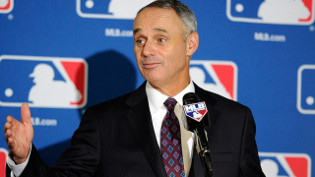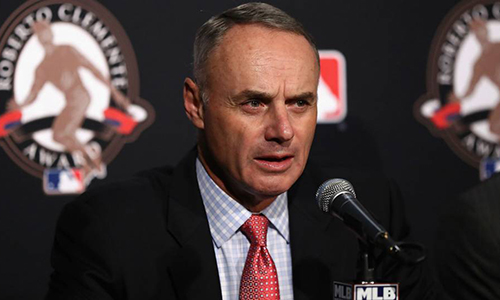MLB Commish Might Actually be Cool with Sports Betting
Professional sports leagues have historically been real sticks-in-the-mud when it comes to sports betting (Too strong of a term? Perhaps fuddy-duddies?). They have always been scared to death that legalizing it would lead to the erosion of their games’ integrity, rather than understanding or admitting that “illegal” sports betting is exponentially more dangerous than is legal, regulated sports betting. But perhaps, slowly but surely, the leagues are coming around. On Wednesday at the Yahoo Finance All Markets Summit in New York, Major League Baseball (MLB) Commissioner Rob Manfred let the audience know something that may have been unheard of just a few years ago: he has an open mind about sports betting.
“There is this buzz out there in terms of people feeling that there may be an opportunity here for additional legalized sports betting. From the perspective of our sport, we are reexamining our stance on gambling. It’s a conversation that’s ongoing with the owners,” he said.
He elaborated:
And here’s the issue, and I think [NBA] Commissioner [Adam] Silver has probably framed it the best. Betting can be a form of fan engagement, it can fuel the popularity of a sport. We all understand that. Point one.
Point two: Sports betting happens. Whether it’s legalized here or not, it’s happening out there. So I think the question for sports is really, are we better off in a world where we have a nice, strong, uniform, federal regulation of gambling that protects the integrity of sports, provides sports with the tools to ensure that there is integrity in the competition. Or are we better off closing our eyes to that and letting it go on as illegal gambling?
And that’s a debatable point. It is a debatable point, and it’s one we’re discussing internally.

MLB Commissioner Rob Manfred
Photo credit: mlb.com
Manfred referenced his NBA counterpart, Adam Silver, in his remarks. Silver expressed his desire to see sports betting (and later daily fantasy sports) legalized on the federal level back in September 2014 when speaking at the Bloomberg Sports Business Summit.
“If you have a gentleman’s bet or a small wager on any kind of sports contest, it makes you that much more engaged in it,” he said. “That’s where we’re going to see it pay dividends. If people are watching a game and clicking to bet on their smartphones, which is what people are doing in the United Kingdom right now, then it’s much more likely you’re going to stay tuned for a long time.”
In November of that year, Silver doubled-down on this sentiment, penning an op-ed for the New York Times.
Sports betting, because of its illegality virtually everywhere in the United States, was “….a thriving underground business that operates free from regulation or oversight,” he wrote.
Silver continued, letting the common sense flow:
There is an obvious appetite among sports fans for a safe and legal way to wager on professional sporting events. Mainstream media outlets regularly publish sports betting lines and point spreads. Voters in New Jersey overwhelmingly voiced their support for legal sports betting in a 2011 referendum. Gov. Chris Christie of New Jersey recently signed a bill authorizing sports betting at local casinos and horse racetracks, a law the N.B.A. and other leagues have opposed — and a federal court has blocked — because it violates Paspa.
Outside of the United States, sports betting and other forms of gambling are popular, widely legal and subject to regulation. In England, for example, a sports bet can be placed on a smartphone, at a stadium kiosk or even using a television remote control.
And then you have National Football League (NFL) Commissioner Roger Goodell, who still insists that his league wants nothing to do with sports betting or DFS, even though nearly every team has some sort of sponsorship deal with a DFS site. American football is by far the most popular sport for sports betting and fantasy in the United States and it is not even remotely close. Millions of people who would otherwise not care about most games tune in, follow online, go to sports bars, etc., just because they have money riding on a random game or have fantasy players in action.
A reported $5 billion was wagered on the Super Bowl, for Pete’s sake. That wasn’t all coming from fans of the New England Patriots and Atlanta Falcons. It was coming from people who didn’t care about who won the game and wanted a little action to give themselves a rooting interest.
Fortunately, Silver is clearly enlightened on the subject and Manfred looks like he has just about decided that the legalization and regulation of sports betting – on the federal level – might actually be a decent idea.



















COMMENTS